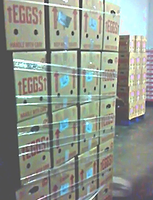Processors of Ethnic Foods Find a ‘Bridge’ to Meeting Skyrocketing Demand
Population migration around the globe, the interest in diverse “foodie” TV and Internet programs, and the trend toward higher quality, healthy packaged foods have all contributed to amazing growth in ready-to-eat (RTE) ethnic foods today.
Whether it is fresh salsa, hummus, gyro meat, Chinese stir fry or tofu, many RTE ethnic foods that were once considered specialty items found in the ethnic food isle of a grocery store are now mainstream offerings. The growth and interest in these types of foods, in fact, has been so phenomenal in the last decade that many of these products no longer seem “ethnic” at all.
Furthermore, this trend shows no signs of slowing any time soon. According to consumer market research firm Mintel, the sales of ethnic foods will grow by another 20 percent in the next couple of years, with diversity increasing substantially from earlier in the decade when Mexican/Hispanic were dominant with over 60 percent share of the ethic food sales.
More recently, Asian and Indian foods grew by 11 and 35 percent, respectively. Other foods of ethnic origin, such as hummus and tofu, have grown by hundreds of percent in popularity around the globe.
To meet the dramatically increasing demand, many smaller, specialty food processors are increasing the variety and type of ready-made ethnic and global fare offerings. Hummus, for example, is now offered in organic and non-organic varieties such as artichoke, eggplant, garlic, roasted red pepper and even chocolate.
Yet, the challenge to smaller food processors is how to expand production to meet the explosive demand for these products. Where modest food processing equipment was adequate even 5 years ago, many now must find cost-effective equipment that can serve as a bridge to meet higher volume requirements while also retaining the authenticity and quality of the dishes they produce.
Handling Warp-speed Growth
The food processing equipment issue was familiar to Jack Aronson, chief executive officer (CEO) of Garden Fresh Gourmet brand foods (Ferndale, MI), the producer of a broad line of handcrafted, all-natural salsa, guacamole, tortilla chips, hummus and other ethnic foods.
Starting out as a husband-and-wife team that began making a fresh blend of artichoke salsa on a small table in the back of their restaurant, Aronson’s company has grown from $4 million in sales in 2004 to over $100 million this year.
“We’re experiencing a lot of growth in ethnic foods.” Aronson explains. “So there is an inherent need for those products to be fresh and natural, and to use authentic ingredients. That’s one of the reasons why ethnic foods like salsa, guacamole and hummus are healthy.”
His passion for creating authentic traditional foods led Aronson to questions about what kind of food processing equipment would enable Garden Fresh to meet skyrocketing demands while still retaining the traditional appearance, taste and texture of the foods that were previously handcrafted in a small kitchen.
In addition to increases in the varieties and volumes of salsas, the company wanted to keep up with the booming popularity of hummus throughout much of the world, because much of Garden Fresh’ growth was due to the rapid growth of that product.
At the same time, Garden Fresh was looking to expand its product line to include Lebanese kofta (an Indian dish of seasoned minced meat), cubano peppers and possibly other ethnic dishes, so flexibility of equipment was also important.
“With an eye to the present and future, we looked at a lot of different types of equipment,” Aronson says. “Then a business associate mentioned that Unitherm Food Systems (Bristow, OK) makes cutting-edge line of cooking and chilling equipment that might be ideal for our company.”
The line includes equipment that is compact yet surprisingly productive and affordable, such as mini flame grills and continuous mini spiral ovens and chillers.
Another important thing was Unitherm had Garden Fresh ship its original product to the factory kitchen where they tested the products using different types of cooking and chilling equipment, Aronson says.
“They recommended specific systems as well as parameters such as cook times and temperatures,” he says.
Aronson says the equipment he bought brought him up to speed in product volume while also enabling him to retain the quality that is essential to Garden Fresh foods. It also allows him the flexibility to handle his growing assortment of products.
“When I do things on a large scale, for example, such as eggplant for my hummus, it goes through the fire-roaster in about 45 seconds,” explains Aronson. “If it is a thick product, like carrots, it also has to be cooked on the inside. So, we put the carrots through our fire roaster to get the caramelization that enhances appearance, and then we bake them in the spiral oven, which finishes the cooking process.”
Garden Fresh also uses the new fire roaster to cook peppers that are used in several dishes, including salsas.
“We used to roast peppers on a gas grill, which was a very painstaking method,” Aronson says. “But when we got a large account, it was obvious that we needed a new approach. Now, using a spiral oven, I can now do 1,000 lbs of vegetables on the spiral oven in the time it took me to do 20 lbs. on a gas oven.”
Unitherm's flame griller and mini flame griller systems function as standalone cookers or as searing ovens that may be used directly in-line with a continuous oven. Adjustable flame burners allow for the enhancement of flavor, color and yield.
The spiral ovens, available in full-size, mini and micro sizes, are recommended for steaming, roasting, broiling and baking, as well as and post pasteurization, and can be coupled with a chiller and loading systems to suit processing needs.
Aronson adds that one of the other benefits of the spiral oven is its compact size, which translates to high volume output in a relatively small space. Because the oven spirals in a vertical direction, the footprint can be as small as 7 ft. × 7 ft. × 5.5 ft.
Spiraling Kabob Sales
When Exotic Foodline L.L.C. (Richardson, TX) began operations in 2002, the market for its frozen Middle Eastern, Indian and Pakistani dishes was less than CEO Mansur Kaiser had anticipated.
“It took 5 or 6 years before the market for these foods began picking up rapidly, and supermarkets were getting interested in our line,” Kaiser explains. “Now, the North American market for these ethnic foods is so strong that I believe it is going to be similar to that of England, where there has been a high demand for years.”
Kaiser adds that with strong sales in the U.S. now, he looks forward to exporting his line into Canada and the Middle East soon, where his type of ethnic dishes promise to be popular.
Kaiser says Exotic Foodline is also expanding its selection of frozen foods. “Our biggest sellers are the grilled barbeque items, particularly kabobs (marketed under the brand name Colonel Kababz). But we also now offer a selection of snack items such as Tandoori chicken wings and samosas, plus several new entrees such as chicken tikka masala and biryani,” explains Kaiser.
Kaiser feels that now that frozen Indian, Pakistani and Middle Eastern foods have caught on, he needs to address the requirements for mass production, which far exceed the capacity of the existing grilling system that he customized in-house.
“We are now looking at Unitherm cooking systems equipment to help us produce the higher volumes of foods that we need in the future,” says Kaiser.
Kaiser adds that one of the unique attractions of Unitherm equipment is the availability of compact cooking systems that have powerful features, yet small footprints. In addition to saving on space, some systems can also keep capital investments lower.
“If I need from 300–500 pounds per hour of production, I don’t want to have to buy equipment that handles 5,000 pounds per hour,” Kaiser explains. “That would be much more expensive and take up too much space.”
“Also, we offer many barbecue items that can’t be prepared on just any type of equipment. So we tested our product on a Unitherm spiral oven and it came out just like it does on the open fire grill. It was very good quality. So that kind of cooking system could be a good bridge for us to produce higher volumes efficiently,” adds Kaiser.
Economical Expansion
The explosive growth of ethnic and global foods has also created a need for “Panache! Creative Cuisine” to meet high volume opportunities without requiring major capital outlays.
“We are launching a new line of “Street Foodz” that will span our six core categories (sandwiches, salads, entrees, snacks & sides, breakfast and desserts) with ethnic flavor profiles,” explains Jonathan Stack, President of “Panache! Creative Cuisine” (Baltimore, MD). “We plan to incorporate Indian, Asian, Mediterranean, European, Cuban, Latin American and other styles of foods into that line, which will require considerably higher volumes.”
Stack says that his company has been growing at a double-digit rate for the past 5 or 6 years, partly due to the success of Panache’s kosher operation “Bubbie’s Gourmet”. The outlook for continued success with other ethnic-based fares is so bright that the company is planning to open additional operations in the South, Midwest and on the West Coast.
“We’ve been studying this growth opportunity for several years,” Stack says. “Unitherm has given us valuable help in understanding our choices of affordable equipment that can allow us to produce ready foods in much higher volumes and still retain or even enhance our quality standards. Also, they have some very innovative designs and that allows us to incorporate more equipment in a limited space along with the ability to process different types of food using the same equipment.”
The type of equipment Panache! is considering includes spiral ovens and chillers, as well as flame tunnels, mini flame grills and rice and pasta cookers. These types of cooking systems provide Panache! with the capability of producing ethnic and world foods that include traditional ingredients and global taste profiles while also featuring authentic textures, markings, color and highlights.
For information contact Unitherm Food Systems, 502 Industrial Road, Bristow, OK 74010; Phone: 918-367-0197; Fax: 918-367-5440; email: unitherm@unithermfoodsystems.com; or visit the website www.unithermfoodsystems.com.
Looking for a reprint of this article?
From high-res PDFs to custom plaques, order your copy today!





